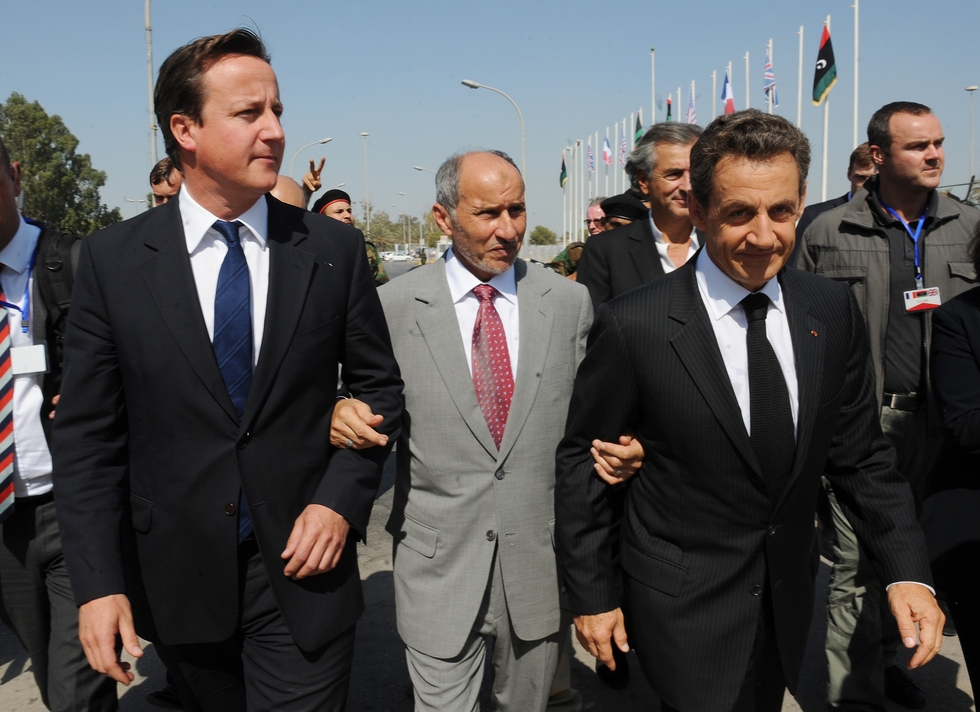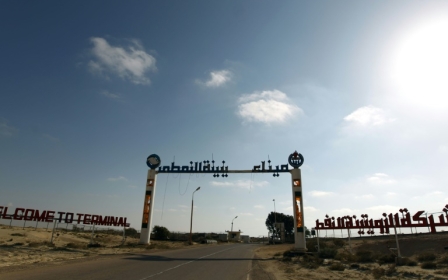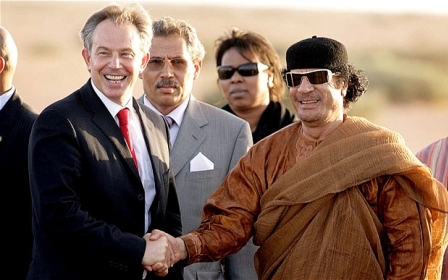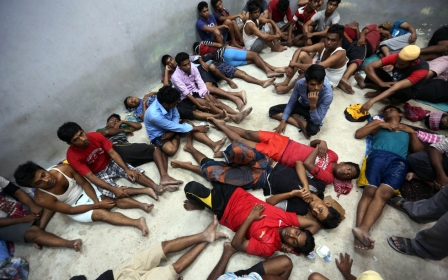A purely British exercise: The UK foreign affairs committee on Libya

The report of the foreign affairs committee of the House of Commons on Libya released on Wednesday can be summarised in just four words: “Next time, think twice.”
The head of the committee, Conservative MP Crispin Blunt, has not minced words in the past when he disagreed with then-Prime Minister David Cameron about his policy on the Middle East and North Africa.
Ultimately, this report should be seen for what it is: a purely British exercise
The report strongly criticises Cameron, who incidentally gave up his seat in parliament earlier this week, for intervening in 2011 in Libya based on faulty or missing intelligence, shifting the goal of the intervention from “responsibility to protect civilians” to regime change and, ultimately, merely following France’s lead without being able to significantly influence the course of military operations.
The report also criticises more recent choices on migration, saying that it was wrong to think that saving people in the Mediterranean would be a “pull factor” for more migrants and reiterating Blunt’s position that sending British special operations forces into Libya needed to have parliamentary approval and a wider discussion about strategy.
The words about the counter-Islamic State (IS) group strategy should resonate throughout Europe and the US: fighting violent extremism is a priority but “the primary objective in Libya should be to support a central authority that can deliver greater stability”.
Courting controversy
Less predictable are the report’s words on the UN, which is criticised in several parts. In the final recommendation, the committee encourages the Foreign Office to “lead the international community to review whether the United Nations is the appropriate body to co-ordinate stabilisation and reconstruction in a post-conflict environment”, making the point that this review is urgent because the UN “might be asked to co-ordinate a similar mission in Syria, Yemen or Iraq in the near future”. This reflects a widely felt distrust between key member states over the ability of the UN to be the key player in the Libyan transition.
Other positions and recommendations in the report may prove even more controversial. The report makes the point that a deal could have been cut with the Gaddafi regime and that former UK prime minister Tony Blair could have worked with Gaddafi’s son, Saif al-Islam.
But would a dictatorship have ever accepted a programme of institution-building, the creation of an independent civil society and the end of its divide and rule policy that has so damaged Libya?
This strategy could have led, according to the committee, to reforms and the emergence of a class of technocrats who were already working with Saif. These include two names that became prominent within the revolution and its aftermath - Mohammed Jibril, the leader of the National Forces Alliance, and Mustafa Abdel Jalil, chairman of the National Transitional Council.
But as the report says, Saif called Blair only once and then never again. Moreover, watchers of the Middle East peace process have learned to appreciate the limits of Blair’s mediation efforts.
Important claims are made about Western powers and Western media exaggerating the threat to civilians, where the reports says that “Muammar Gaddafi’s 40-year record of appalling human rights abuses did not include large-scale attacks on Libyan civilians”. These types of statements and reports failed to account for incidents like the 1996 Abu Salim prison massacre in which 1,200 political prisoners were killed.
The French connection
Much of the blame for the intervention is placed on France’s shoulders and Cameron is criticised for not opposing President Nicholas Sarkozy enough at the time. It was France, the report says, that created the “political momentum” that led to UN Security Council Resolution 1973 which authorised the defence of civilians in Benghazi with “all necessary measures”.
A prominent role was played by then French foreign minister Alain Juppé. Then UK Minister of Defence Liam Fox provided ample evidence and the report writes how the goal established in the UN resolution, namely protecting the civilians of Benghazi, was achieved in late March 2011.
Some of this criticism of France’s policy in 2011 is common also in Italy, another country affected by that intervention. Yet, both the UK and Italy are adult countries with responsibilities and cannot claim to be teenagers who have been misled by an unruly classmate. They had the means to stop the offensive and they did not use them.
More importantly, it’s worth noting how Cameron’s policy in the Middle East and North Africa often overlapped with that of France, with just a short delay. The aborted intervention in Syria of 2013 and that started in December of last year against IS are the most important examples.
Reliance on UK experts
Ultimately, this report should be seen for what it is: a purely British exercise. Its main goal was to assess British policy after 2011 and to do so it rests almost exclusively on the wisdom of British officials and experts.
None of the Libyan officials and experts who live in the UK or who can easily travel to London were questioned about the analysis contained in the report which often proves superficial, talking generically about “militias” and “tribes” as if they were monoliths – more or less the same exercise that populists do when they refer generically to “politicians” in Europe.
Nevertheless, the report is a useful read to understand what the consensus is in British politics about the 2011 intervention and the way forward: refrain from reckless interventions with little intelligence and don’t focus just on IS, but look at the bigger picture of the stabilisation of the country.
But this consensus fails to address some of the most important questions for British policy in the region. Failures are not just about procedure, lack of intelligence or misjudgements of an individual. The report mentions the role of “regional actors” that are “currently undermining the GNA (the UN-backed Government of National Accord) by flouting the UN arms embargo and using Libyan militias as proxies”.
Only the UAE is named and little use is made of evidence presented in the latest report of the independent UN panel of experts which provides ample proof of the Egyptian role. Little or nothing is said about direct Egyptian and UAE air strikes or about their ability to hijack the political process.
Deals prioritised?
While calling for the re-enforcing of the arms embargo, the report fails to link this recommendation with a political strategy. This would imply that conclusions have been drawn about the balance between the pursuit of UK business interests and arms deals with the Gulf countries and Egypt, on the one hand, and the need to stabilise a region that is inflamed by the policies of the same countries on the other.
Finally, the report rightly and predictably blames Cameron for the lack of political strategy once he decided to go for regime change. Given that, in the committee’s judgement the opposition had dangerous Islamist components, the conclusion is that it would have been better to negotiate “reforms” with the Gaddafi regime.
But was the regime “reformable”? Would a dictatorship based on the absence of rules and institutions have ever accepted a programme of institution-building, the creation of an independent civil society and the end of its divide and rule policy that has so damaged Libya, pitting one community against the other?
Ultimately, it is fair to wonder whether the work of this committee leads not just to say “think twice before intervening” but also “think twice before supporting the overthrow of a dictator”.
- Mattia Toaldo is Senior Policy Fellow at the European Council on Foreign Relations.
The views expressed in this article belong to the author and do not necessarily reflect the editorial policy of Middle East Eye.
Photo: Prime Minister David Cameron (L) and French President Nicolas Sarkozy (R) walk with National Transitional Council (NTC) chairman Mustafa Abdul Jalil (C) at the Tripoli Medical Centre in Tripoli on 15 September 2011. (AFP)
This article is available in French on Middle East Eye French edition.
New MEE newsletter: Jerusalem Dispatch
Sign up to get the latest insights and analysis on Israel-Palestine, alongside Turkey Unpacked and other MEE newsletters
Middle East Eye delivers independent and unrivalled coverage and analysis of the Middle East, North Africa and beyond. To learn more about republishing this content and the associated fees, please fill out this form. More about MEE can be found here.






